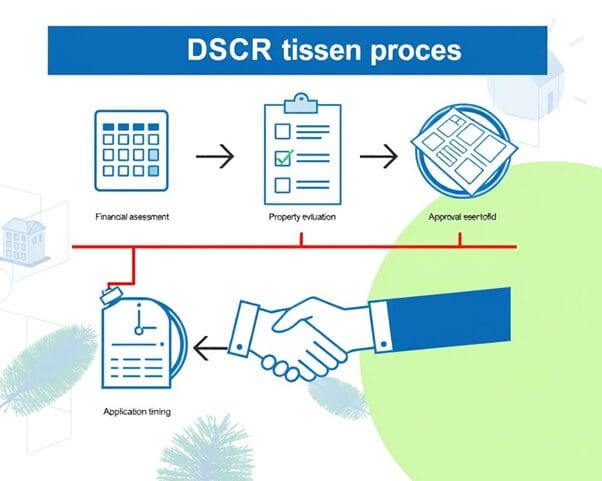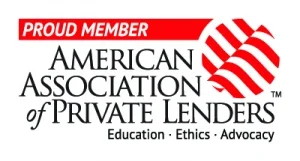Are you a real estate investor looking for financing without showing personal income? DSCR loans might be what you need. How can rental income alone qualify you for such big loans?
The process of getting a DSCR loan might seem hard at first. But it’s based on the rental income of a property covering loan repayments. This method looks at the property’s income potential, not your personal finances. Knowing how to get a DSCR loan is key for anyone wanting a rental property loan, whether you’re new or expanding your portfolio.
For newcomers, the Debt Service Coverage Ratio (DSCR) is a financial tool lenders use. It checks if there’s enough cash flow to cover loan payments. A property’s DSCR should be between 1.2 to 1.5 to qualify for these loans. A higher DSCR means less risk for lenders, showing the rental income can easily pay off the loan.
Tidal Loans LLC makes getting a DSCR loan easier with its online application. It doesn’t hurt your credit score. They offer help to make sure you know what to do. For more help, call Tidal Loans LLC at 832-757-1262 or email info@www.tidalloans.com.

Key Takeaways
- The ability of a property to generate rental income is paramount for DSCR loan approval.
- Most DSCR loans require a DSCR ratio between 1.2 to 1.5.
- Loan amounts can range from $1 million to $5 million based on the property’s DSCR.
- A credit score of 660 and above is commonly required for these loans.
- DSCR loans are applicable for various property types, making them versatile for real estate investors.
Understanding DSCR Loans
DSCR loans are key in real estate investment. They focus on a property’s ability to make enough rental income to cover loan payments. This type of loan is perfect for investors who want properties that make money.
What is a DSCR Loan?
A DSCR loan is a mortgage for investment properties. It checks if the rental income is enough to pay off the loan. The goal is to have more rental income than loan payments.
DSCR loans are used for many types of properties. They can be for homes or commercial buildings. The loan amount can be from $100,000 to $3 million. To qualify, you need a good DSCR ratio and a FICO score of at least 620 to 660.
The Importance of the DSCR Ratio
The DSCR ratio shows if a property can pay off its debt. It’s calculated by dividing the net operating income by the debt service. Lenders want a DSCR of at least 1.2.
This means the property makes enough money to cover debt and other costs. A high DSCR ratio helps get loans for investment properties. It shows the property is financially stable and lowers the lender’s risk. Plus, DSCR loans don’t require proof of income, making it easier for investors to qualify.
Benefits of DSCR Loans for Real Estate Investors
Real estate investors face many financial challenges when growing their portfolios. DSCR loans offer a way to simplify financing and reduce personal risk. These loans make the process easier and provide benefits specifically for real estate investing.
No Income Verification
DSCR loans don’t require checking your income. You can get financing based on your property’s income, not your personal earnings. This is great for investors who want to keep their personal and business finances separate.
Getting approved for a DSCR loan focuses on the property’s financial health, not your income. This makes it easier to qualify for large loan amounts.
Range of Property Types
DSCR loans work with many property types. You can invest in single-family homes, multi-family units, commercial properties, and hotels. This lets you diversify your portfolio and explore different markets.
Some DSCR loan programs even offer unlimited financing. This helps investors grow their operations quickly.
Flexible Loan Terms
DSCR loans come with flexible terms. They offer terms from 30 to 40 years and different types of mortgages. You can choose fixed-rate, adjustable-rate, or interest-only options.
This flexibility lets you tailor your financing to fit your investment goals. DSCR loans also make it easier to finance multiple properties at once. This means you can quickly expand your portfolio without constant income checks.
The benefits of DSCR loans include no income verification, a wide range of property types, and flexible terms. Understanding DSCR mortgage requirements and qualifications is key to maximizing your real estate investment potential.
Investment Property Loans for DSCR
Looking to finance investment properties? A DSCR mortgage is a great option. It offers flexibility and financial benefits for real estate investors. These loans focus on the property’s income, not the borrower’s personal income.
Eligible Property Types
DSCR loans are for many property types that make money through rentals. These include:
- Single-family residences
- Multifamily dwellings
- Commercial real estate
- Short-term rentals like Airbnb properties
Whether you want a DSCR loan for Airbnb or a commercial space, these loans fit various property types. They offer diverse investment chances. Loan amounts range from $100,000 to $5,000,000, needing a DSCR ratio of 1.2.
DSCR loans often require higher down payments, 20-30%. This ensures the borrower has a big stake in the property. Lenders also look for properties worth $150,000 or more, making sure they’re good investments.
If you’re looking to invest in income-generating properties, a DSCR mortgage is perfect. It lets investors diversify their portfolios and get a steady income.
How to Get a DSCR Loan
The DSCR loan process has several steps. It’s important to know each one to get your investment right. I’ll show you how to get a DSCR loan and what to expect.
Find a Lender
Finding the right DSCR loan lenders is the first step. Look for lenders who know these loans well and understand your needs. Make sure their requirements fit your property.
Submit Initial Information
Next, you’ll share basic info about your property. This includes cash flow, property type, and potential income. Lenders use this to check the loan’s risk and see if you qualify.
Gather and Submit Documents
After the initial info, the lender will ask for more detailed documents. You’ll need to gather property cash flow documents, like rental income statements. Personal financial records are usually not needed, making this part easier.
Loan Closing
The last step is to submit all paperwork and go through an appraisal and underwriting. You’ll then review everything before signing the loan agreement. The DSCR loan process is faster than traditional loans because it focuses on property income, not your credit history.
DSCR Mortgage Requirements
Understanding DSCR mortgage requirements is key to getting a loan. This section covers what you need, like a good credit score and a certain debt coverage ratio. These are important for getting a DSCR loan.
Credit Score Requirements
The credit score is very important for DSCR loans. Most lenders want a score of at least 680. But, a higher score can get you better loan terms and lower rates.
Keeping your credit history clean is crucial. Late payments and credit checks can hurt your score. For more info, check out Tidal Loans.
Debt Service Coverage Ratio
The debt service coverage ratio (DSCR) is key. It’s the net income divided by the monthly loan payment. Lenders want a DSCR of 1.2 or more.
For example, if your net income is $100,000 and your debt is $50,000, your DSCR is 2.0. This shows the property can cover its debt, making lenders feel safer.
Loan-to-Value (LTV) Ratio
The loan-to-value (LTV) ratio is also important. Lenders want an LTV of 80% or less. This means you need to put down at least 20% of the property’s value.
This ratio helps protect lenders by ensuring there’s enough equity in the property. Some lenders might also ask for three to six months of cash reserves.
Understanding these requirements is crucial. With the right knowledge, you can get the financing you need for your investment properties.
DSCR Loan Qualifications
Understanding dscr loan qualifications is key for investors. They need to know the criteria for financing income-producing properties. Key criteria include:
Firstly, borrowers must prepare for a down payment of 20-25%. This ensures enough equity in the property. It meets the industry’s standards.
Credit score is crucial, needing a minimum FICO score of 640. But, better terms are given to those with scores over 680. A higher score can lead to better loan terms and lower interest rates.
The minimum Debt Service Coverage Ratio (DSCR) lenders look for is 1.2 to 1.5. This means the property must make $1.20 to $1.50 in income for every dollar of debt. This ratio shows the property can handle its debt with its income.
- Loan-to-Value (LTV) ratio: Usually capped at 80% or less, to ensure the loan doesn’t exceed 80% of the property’s value.
- Cash Reserves: Lenders want applicants to have three to six months of savings. This shows financial stability.
- Experience: Lenders look at the management team’s experience and the business’s history. This is especially true for DSCR investment property loans, where past success is a good indicator of future performance.
Eligible properties for DSCR investment property loans include single-family homes, multifamily properties, and commercial spaces like offices and hotels. But, properties like agricultural lands, manufactured homes, and multi-family housing with more than four units are not eligible.
In summary, dscr loan qualifications focus on the property’s income, not the borrower’s finances. This makes DSCR loans great for investors looking to grow their portfolios without traditional lending constraints.
DSCR Loan Programs and Rates
DSCR loan programs offer many financing options for real estate investors. You can choose from stable or flexible plans, depending on your needs.
Fixed-Rate vs Adjustable-Rate
Choosing between a fixed-rate DSCR mortgage and an adjustable-rate loan is key. A fixed-rate DSCR mortgage means your payments stay the same for 30 years. This is great for those who like knowing exactly what they’ll pay each month.
Adjustable-rate mortgages (ARMs) start with lower rates but can change over time. They might save you money at first but could lead to higher payments later. ARMs are good for investors looking for quick profits.
Interest-Only Options
With interest-only DSCR loans, you only pay interest for a while before starting to pay off the principal. This can make your monthly payments lower, helping you manage more properties or other financial needs.
This interest-only period usually lasts up to ten years. Then, your payments will include both interest and principal, matching standard DSCR loan rates.
DSCR loan programs and rates cater to various investment strategies. They provide a wide range of options for real estate investors. These programs help with detailed financial planning and growing your investments.
DSCR Loan Lenders
Finding the right DSCR loan lenders is key for real estate investors. They need loan terms and rates that are favorable. It’s important to look at different lenders to see who fits your investment goals best.
Top Lenders to Consider
Several lenders stand out for their competitive rates and reliability:
- New Silver: Offers DSCR loans with no minimum debt service coverage ratio requirement.
- Kiavi: Provides rental loans with rates starting at 7.250%, an LTV of up to 80%, and no pre-payment penalty after three years.
- Griffin Funding: Offers loans up to $5 million, requiring a 20% down payment and a DSCR as low as 0.75.
- Angel Oak: Provides investor cash flow loans up to $1.5 million without income or employment verification.
- Truss Financial Group: Offers DSCR loans ranging from $100,000 to $3 million and “no ratio” loans for shortfall rental incomes.
- Lima One Capital: Requires a DSCR of 1.5 or more, with a minimum FICO score of 700 for short-term rental loans.
What to Look for in a DSCR Lender
- Diversity in Loan Products: The best DSCR mortgage providers offer various loan products catering to different property types and investment strategies.
- Ease of Application: Choose lenders with streamlined application processes to facilitate quick approvals and minimal hassle.
- Approval Rates: High approval rates are an indicator of a lender’s willingness to accommodate various borrower profiles and investment types.
- Processing Speed: Fast processing speeds for loan closing help retain good investment opportunities by enabling timely property acquisitions.
- Transparency in Fees: Lenders should be clear about fees and any penalties, including those for early loan settlement, to avoid unexpected costs.
By looking at these factors, you can find the best DSCR mortgage providers. This will help you achieve your investment goals and secure funding for your properties.
Conclusion
Getting a DSCR loan is a great way for real estate investors to grow their portfolios. These loans look at the property’s income, not the investor’s. This makes it easier for investors to get the funds they need.
To get a DSCR loan, start by finding a lender and gathering your documents. Lenders need a DSCR of 1.20, meaning the property must earn 20% more than its debt. A good credit score, over 680, is also important.
But, it’s key to remember that DSCR loans focus on the property’s cash flow, not your personal finances. This makes them more accessible. You can use these loans for many types of properties, from homes to commercial buildings.
To apply successfully, make sure you have all your documents ready. This includes rental income, proof of ownership, and bank statements. Even though the interest rates might be a bit higher, the benefits are worth it.
For personalized help, consider reaching out to experts like Tidal Loans LLC. They can guide you through the process. With their help, you can grow your real estate portfolio and increase your rental income.


